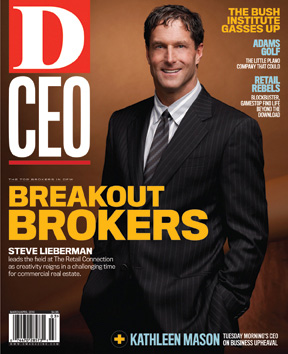Late last year, three of the biggest names in business went buyout shopping in North Texas. Warren Buffett’s Berkshire Hathaway cut a $34 billion deal for Burlington Northern Santa Fe in Fort Worth. ExxonMobil bid $31 billion for XTO Energy, also from Fort Worth. And Round Rock-based Dell bought Perot Systems of Plano for $3.9 billion.
The targets, stock market, and media were gleeful about the combinations. The buyers offered hefty premiums above the market price, and the big-dollar action stoked hopes of new momentum for the M&A business.
There was much discussion about whether the offers were high enough, and lawyers rushed to file the requisite lawsuits seeking more. Local chamber officials worried about the effects on corporate giving.
But something else, something lost, didn’t get much attention. These companies no longer will be independent and publicly traded—a structure that, taken together, nurtured their outstanding performance.
Attribute their success to leadership, vision, execution, even some fortunate timing. But somewhere in the mix add the process of going public, being public, and fighting their way to the top of a very talented class. The free-market capitalist system and its relentless pressure are part of the special sauce.
Many executives are relieved to leave behind the public markets. They complain about the quarterly demands and short-term thinking, and the wasted time. A CEO can save 50 hours a year by no longer having to meet with shareholders and analysts, says Robert Miles, a Buffett expert.
Who wouldn’t prefer less short-term pressure and fewer outside distractions? The trade-off is that the public markets serve as an effective taskmaster. They force companies to ratchet up improvements and create wealth for their backers—or face the wrath of Wall Street traders.
BNSF handled the pressure just fine, thank you. In the past five years, BNSF stock returned five times more than the legendary Berkshire, even before tacking on the premium Buffett added last November.
XTO’s results were more amazing. From 1999 to 2008, revenue grew from $341 million to $7.7 billion, as the company continued to find more natural gas. The stock soared an average of 43 percent a year over the past decade.
Matt Rose, CEO of BNSF, says that investors are less patient today, so there’s constant pressure to perform. “The bar keeps getting higher, and companies have to stretch and get more aggressive,” Rose says. “Generally, the model has worked very well.”
So why jump into Buffett’s arms? The litmus test was the offer—a 31 percent windfall for BNSF shareholders, paid in stock and cash. XTO got a 25 percent premium and Perot Systems, a whopping 68 percent more than its previous closing stock price. Such offers are hard to reject, especially when they come from admired giants.
ExxonMobil and Dell want their acquisitions to become fast-growth divisions within their larger operations. Buffett will leave BNSF alone. Because he doesn’t change management, meddle, or pile on debt, Rose says that everything will stay the same, providing “an excellent home for the company.”
Miles, author of The Warren Buffett CEO, says he interviewed 20 chief executives whose companies were sold to Berkshire, and the sentiment was unanimous. “All of them, to a person, said they were absolutely delighted after the sale,” Miles says. “Buffett becomes the ideal boss and the ideal buyer, because he lets them do what they’ve been doing.”
That may work for Buffett. He’s so revered that people refuse to disappoint him. And he’s so good at picking companies that there’s less risk of an acquisition sloughing off.
But for the rest of the universe, it’s better to stay on edge, a little out of the comfort zone. Andrew Grove, the former Intel CEO, was famous for his business motto, “Only the paranoid survive.”
The warning applies whether a company is public or private. Some private-equity managers have produced startling results by taking over public companies, loading on debt, and wringing out more costs.
But the most intense competition in corporate America is usually on the public stage. The companies are bigger, the stakes higher, and Wall Street’s daily scorecard tracks the leaders and laggards—and rewards them accordingly.Taken as a whole, the process makes the survivors stronger.
In 2002, Nestlé sold about a quarter of its shares in Alcon Laboratories in a public offering. The partial spinoff made the Fort Worth eye-care company more visible and more accountable to Wall Street, while keeping Nestlé in a position to profit if Alcon’s stock soared. Alcon had long been successful in making eye medications and contact lens solution, but competing in the public sphere forced the company to pick up its game.
The offering marked the start of a long bull run. About 25 percent of Alcon employees received stock options, so their net worth got a boost. They also enjoyed the attention, as neighbors began to follow Alcon more closely.
The cycle has come full circle. Novartis, a Swiss drugmaker, bought a chunk of Nestlé’s Alcon stake in 2008 and, in January, unveiled plans to buy all the shares in the biggest acquisition in Swiss history.
That means Alcon won’t trade on the stock market anymore. People may argue about the merits of being public, but there’s no doubt about the payoff for Alcon’s stakeholders. In 2002, when the stock began trading, Alcon was at $33. Novartis’ latest offer to Nestlé: $180 a share.
Mitchell Schnurman is the business columnist for the Fort Worth Star-Telegram. For the past four years, his column was named the “Best in Business” by the Society of American Business Editors and Writers.





